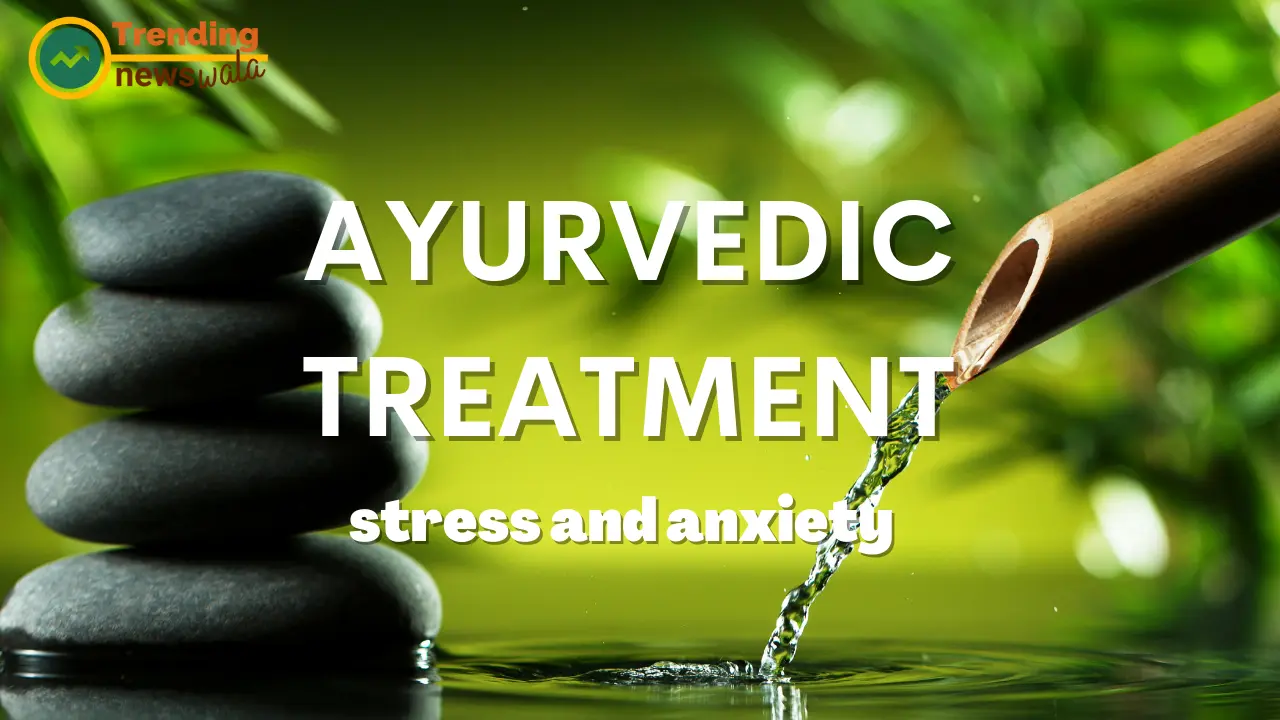Stress and anxiety have become increasingly common in our modern world, affecting millions of people worldwide. Whether it's due to work pressure, relationship issues, financial problems, or personal struggles, stress and anxiety can have a profound impact on our physical and mental health. While there are various treatments available, many people are turning to Ayurveda, an ancient system of medicine that focuses on holistic healing and prevention of disease. In this article, we will explore the Ayurvedic approach to treating stress and anxiety and how it can help you achieve greater balance and well-being.
Understanding Stress and Anxiety in Ayurveda
Ayurveda sees stress and anxiety as a manifestation of an imbalance in the doshas, or the three bodily humors that govern our physical and mental functions. The three doshas - Vata, Pitta, and Kapha - represent the five elements (ether, air, fire, water, and earth) that make up our bodies and the universe. Each person has a unique combination of these doshas that determine their physical and mental characteristics.
In Ayurveda, stress and anxiety are primarily caused by an increase in the Vata dosha, which is associated with movement, creativity, and change. When Vata becomes imbalanced, it can lead to restlessness, worry, fear, and nervousness. Other factors that can contribute to stress and anxiety in Ayurveda include a buildup of toxins (ama) in the body, poor digestion, and weak immunity.
Ayurvedic Treatment for Stress and Anxiety
Ayurvedic treatment for stress and anxiety involves a combination of herbal remedies, dietary changes, lifestyle modifications, and mind-body practices. The goal is to balance the doshas, eliminate toxins, improve digestion, and enhance overall well-being.
Herbal Remedies
Ayurveda has a rich tradition of using herbs and spices to promote health and healing. Some of the herbs commonly used to treat stress and anxiety include ashwagandha, brahmi, shankhapushpi, jatamansi, and guduchi. These herbs have adaptogenic properties, which means they help the body adapt to stress and improve resilience. They also have a calming effect on the nervous system and promote relaxation.
Dietary Changes
In Ayurveda, diet plays a crucial role in maintaining health and preventing disease. For stress and anxiety, Ayurvedic diet recommends consuming foods that are grounding, nourishing, and easy to digest. This includes warm, cooked foods, whole grains, vegetables, and fruits. Avoiding processed, refined, and spicy foods is also important as they can aggravate the Vata dosha and lead to imbalances.
Lifestyle Modifications
Ayurveda emphasizes the importance of maintaining a healthy lifestyle to prevent and treat diseases. For stress and anxiety, Ayurvedic lifestyle modifications include practicing relaxation techniques such as yoga and meditation, getting adequate rest, and engaging in gentle exercise like walking or swimming. It is also important to avoid overstimulation and excessive use of electronic devices, which can disrupt the natural rhythms of the body.
Mind-Body Practices
Ayurveda recognizes the mind-body connection and the role of emotions in health and disease. To address stress and anxiety, Ayurvedic mind-body practices include pranayama (breathing exercises), meditation, and self-massage with warm oil (abhyanga). These practices help calm the mind, reduce stress, and promote relaxation.
Ayurvedic Treatment for Specific Types of Stress and Anxiety
In Ayurveda, stress and anxiety are not viewed as a single condition but rather as a complex interplay of physical, mental, and emotional factors. Therefore, the treatment approach may vary depending on the type of stress and anxiety. Let's explore some common types of stress and anxiety and how Ayurveda can help.
- Generalized Anxiety Disorder (GAD)
Generalized Anxiety Disorder (GAD) is characterized by excessive worry and fear about everyday situations, events, or activities. People with GAD often have physical symptoms such as restlessness, fatigue, irritability, and difficulty sleeping. Ayurvedic treatment for GAD may include:
- Ashwagandha: Ashwagandha is an adaptogenic herb that helps the body cope with stress and anxiety. It also supports the nervous system and promotes relaxation.
- Brahmi: Brahmi is a herb that has a calming effect on the mind and helps improve memory and concentration.
- Nasya: Nasya is an Ayurvedic therapy that involves applying medicated oil to the nasal passages. It helps improve respiratory function and can help reduce anxiety.
- Panic Disorder
Panic disorder is characterized by sudden and unexpected panic attacks, which are accompanied by physical symptoms such as heart palpitations, sweating, trembling, and shortness of breath. Ayurvedic treatment for panic disorder may include:
- Jatamansi: Jatamansi is a herb that has a calming effect on the mind and helps reduce anxiety and panic attacks.
- Shirodhara: Shirodhara is an Ayurvedic therapy that involves pouring a stream of warm oil on the forehead. It helps calm the mind and nervous system and can be helpful in reducing panic attacks.
- Pranayama: Pranayama, or breathing exercises, can help reduce the intensity and frequency of panic attacks by calming the nervous system and reducing stress.
- Social Anxiety Disorder
Social Anxiety Disorder (SAD) is characterized by a fear of social situations and a tendency to avoid them. People with SAD often have physical symptoms such as blushing, sweating, and trembling. Ayurvedic treatment for SAD may include:
- Guduchi: Guduchi is a herb that helps boost immunity and reduce stress and anxiety.
- Abhyanga: Abhyanga is a self-massage with warm oil that helps calm the nervous system and promote relaxation.
- Vacha: Vacha is a herb that has a calming effect on the mind and can help reduce social anxiety.
- Post-Traumatic Stress Disorder (PTSD)
Post-Traumatic Stress Disorder (PTSD) is a condition that can occur after experiencing or witnessing a traumatic event. People with PTSD often have intrusive thoughts, nightmares, and flashbacks, as well as physical symptoms such as sweating, trembling, and a racing heart. Ayurvedic treatment for PTSD may include:
- Shankhapushpi: Shankhapushpi is a herb that helps calm the mind and improve memory and concentration.
- Shirobasti: Shirobasti is an Ayurvedic therapy that involves pouring warm oil on the head and keeping it there for a period of time. It can help calm the mind and reduce PTSD symptoms.
- Meditation: Meditation can help reduce the intensity and frequency of intrusive thoughts and flashbacks by calming the nervous system and reducing stress.
Conclusion
Stress and anxiety are common conditions that can have a significant impact on our physical and mental health. Ayurveda offers a holistic approach to healing that addresses the underlying causes of stress and anxiety and promotes overall well-being. By incorporating herbal remedies, dietary changes, lifestyle modifications, and mind-body practices, Ayurvedic treatment can help reduce stress and anxiety and improve our quality of life.
If you are experiencing stress and anxiety, it is important to consult with a qualified Ayurvedic practitioner to receive personalized treatment. They can help determine the root cause of your condition and develop a treatment plan that is tailored to your individual needs.
In addition to Ayurvedic treatment, there are also lifestyle changes that you can make to help reduce stress and anxiety. These include:
- Regular exercise: Exercise has been shown to reduce stress and anxiety by releasing endorphins, the body's natural mood boosters.
- Healthy diet: Eating a healthy, balanced diet can help improve overall health and reduce stress and anxiety.
- Mindfulness practices: Mindfulness practices such as yoga, meditation, and deep breathing exercises can help calm the mind and reduce stress.
- Adequate sleep: Getting enough restful sleep is important for overall health and can help reduce stress and anxiety.
In conclusion, stress and anxiety can have a significant impact on our physical, mental, and emotional well-being. Ayurvedic treatment offers a holistic approach to healing that can help address the underlying causes of stress and anxiety and promote overall health and well-being. By incorporating lifestyle changes, mind-body practices, and personalized Ayurvedic treatment, it is possible to reduce stress and anxiety and improve our quality of life.

What is Ayurveda?
Ayurveda is a traditional system of medicine that originated in India over 5000 years ago. It emphasizes a holistic approach to health and wellness, focusing on balancing the mind, body, and spirit.
Can Ayurveda treat stress and anxiety?
Yes, Ayurveda can help treat stress and anxiety. Ayurvedic treatment includes herbal remedies, dietary changes, lifestyle modifications, and mind-body practices to help reduce stress and anxiety.
What are some Ayurvedic herbs for stress and anxiety?
Some Ayurvedic herbs for stress and anxiety include ashwagandha, brahmi, jatamansi, guduchi, and shankhapushpi. These herbs have calming effects on the mind and nervous system and help reduce stress and anxiety.
What are some Ayurvedic therapies for stress and anxiety?
Some Ayurvedic therapies for stress and anxiety include shirodhara, nasya, shirobasti, and abhyanga. These therapies involve the use of warm oils, herbal powders, and medicated liquids to help calm the mind and reduce stress and anxiety.
What are some lifestyle changes that can help reduce stress and anxiety?
Some lifestyle changes that can help reduce stress and anxiety include regular exercise, healthy diet, mindfulness practices such as yoga and meditation, and adequate sleep.
Is Ayurvedic treatment safe?
Ayurvedic treatment is generally safe when administered by a qualified practitioner. However, it is important to ensure that the practitioner is properly trained and uses high-quality herbs and oils.
How long does Ayurvedic treatment take to show results?
The length of Ayurvedic treatment for stress and anxiety varies depending on the severity of the condition and the individual's response to treatment. Some people may experience relief within a few weeks, while others may require several months of treatment.
Can Ayurvedic treatment be used alongside conventional treatments?
Yes, Ayurvedic treatment can be used alongside conventional treatments for stress and anxiety. However, it is important to consult with a qualified practitioner and inform them of any other treatments or medications you are taking.
Are there any side effects of Ayurvedic treatment?
Ayurvedic treatment is generally safe and does not have any significant side effects. However, some people may experience mild side effects such as nausea, diarrhea, or skin irritation.
How can I find a qualified Ayurvedic practitioner?
You can find a qualified Ayurvedic practitioner by asking for recommendations from friends and family, searching online directories, or contacting Ayurvedic organizations in your area. It is important to ensure that the practitioner is properly trained and licensed to practice Ayurveda.



